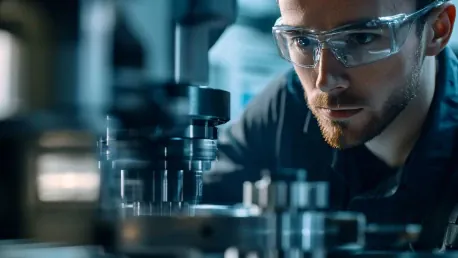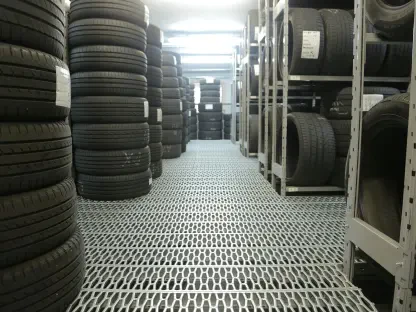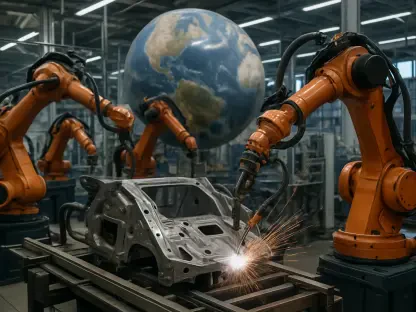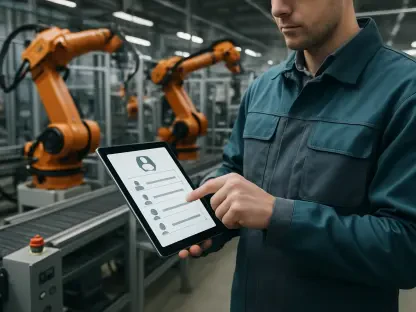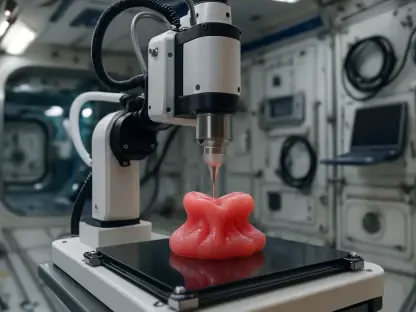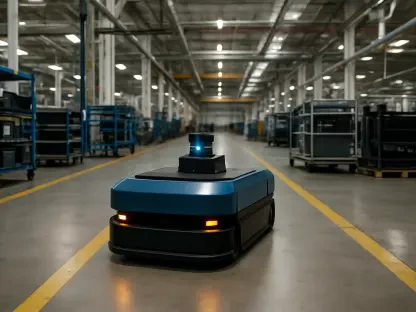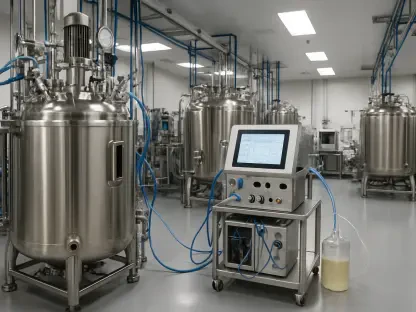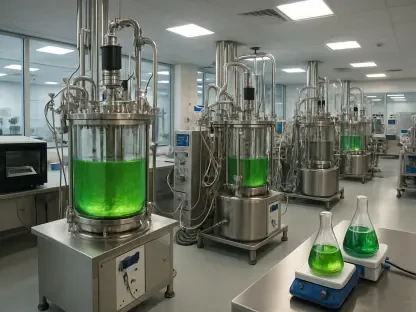The manufacturing industry is undergoing a profound transformation driven by the integration of advanced technologies. These innovations are not only enhancing efficiency and productivity but also reshaping the landscape of manufacturing. From robotics and automation to AI and smart building technologies, the future of manufacturing is being redefined. Key transformative technologies are playing a crucial role in shaping the future of this sector, leading to remarkable advancements and unprecedented changes. The following sections explore different facets of these technological revolutions and their impact on the manufacturing industry.
Advanced Robotics Revolution in UK’s Auto Factories
The United Kingdom’s automotive production sector is experiencing a significant transformation with the advent of the fifth industrial revolution (5IR). This evolution, which has progressed rapidly even as the fourth industrial revolution (4IR) began barely a decade ago, primarily focuses on the integration of advanced robotics into the manufacturing process. These cutting-edge robotic technologies bring about a new level of precision, efficiency, and productivity, significantly revolutionizing the automotive industry in the UK. Companies are embracing these advanced systems not only to boost production rates but also to enhance the quality of their output.
This marks a pivotal shift toward more sophisticated manufacturing hubs, underscoring the increasing reliance on automated systems. The integration of robotics is not just about replacing human labor but augmenting it, allowing for more complex and high-quality production processes. This blend of human expertise and robotic precision is driving the UK automotive sector to new heights, fostering innovation and setting new standards in manufacturing excellence. As these technologies continue to evolve, their impact on production efficiency and product quality will undoubtedly keep shaping the future of the automotive industry in the region.
Supply Chain Efficiency in CNC Manufacturing
Supply chain efficiency remains a critical challenge in CNC (Computer Numerical Control) manufacturing. A prominent issue within this domain is demand forecasting inaccuracies, which can lead to either stock shortages or excessive inventory. These missteps have critical financial implications, causing significant disruption to manufacturing schedules and financial planning. In response to these challenges, companies in the CNC manufacturing sector are continuously seeking innovative solutions and enhancements that can streamline inventories, boost delivery times, and ultimately drive manufacturing efficiency.
Enhanced predictive analytics and real-time data integration are some of the technological advancements being employed to counter these challenges. By leveraging these advanced technologies, manufacturers can gain better visibility into their supply chains, make more accurate demand forecasts, and optimize their inventory management processes. This proactive approach not only minimizes financial losses due to inventory mismanagement but also ensures smoother and more efficient production schedules. The emphasis on robust and reliable supply chains is paramount as manufacturers strive to meet the demands of a rapidly changing market and maintain competitiveness.
Strategic Cybersecurity Decisions – Zero Trust Network Access
As described in PwC’s 27th Annual Global CEO Survey, the current business climate is one of “continuous reinvention,” where nearly half of the CEOs surveyed express doubts about their company’s viability over the next decade if there is no strategic pivot. This underscores the criticality of robust cybersecurity frameworks. One prominent strategic decision on the horizon for many companies is choosing Zero Trust Network Access (ZTNA) over traditional Virtual Private Networks (VPNs). ZTNA represents a paradigm shift in cybersecurity, advocating for a verification-everywhere approach instead of relying solely on perimeter defenses.
For the C-Suite, this decision involves evaluating the long-term benefits of enhanced security, scalability, and adaptability against the backdrop of evolving cyber threats. Implementing ZTNA can significantly reduce the risk of cyber-attacks and ensure the protection of sensitive manufacturing data. This shift toward a more secure and adaptable cybersecurity framework is essential for modern manufacturers to safeguard their operations and maintain trust with their stakeholders. As cyber threats continue to evolve, the adoption of ZTNA will likely become a crucial aspect of strategic decision-making in the manufacturing industry, enhancing overall security and resilience.
Talent Development in US Manufacturing
Another pressing issue is the talent shortage in the US manufacturing sector. The convergence of reshoring initiatives, the impending wave of retirements, and new technological advancements have led to a significant gap in the workforce. This shortage of skilled labor poses a considerable challenge, with 65% of manufacturers identifying talent acquisition and retention as their primary business difficulty. Moving forward, it is crucial to proactively develop talent pipelines today to secure a prosperous manufacturing landscape tomorrow.
This involves a multifaceted approach, including investing in education, promoting vocational training, and creating rewarding career pathways to attract and retain the workforce. By fostering a skilled and adaptable workforce, the manufacturing sector can continue to innovate and thrive. Companies must collaborate with educational institutions, government agencies, and industry associations to develop programs that prepare the next generation of manufacturing professionals. Emphasizing the importance of continuous learning and professional development will also be key in ensuring that workers remain up-to-date with the latest technological advancements and industry best practices.
Large Format Additive Manufacturing (LFAM)
Large Format Additive Manufacturing (LFAM) represents a groundbreaking shift in production capabilities. Manufacturers, whether already utilizing this technology or still exploring its potential, need to carefully evaluate its suitability for specific parts production. LFAM offers significant advantages for creating large, complex components that traditional manufacturing methods struggle to produce efficiently. It is crucial to assess which parts can be optimized with LFAM, taking into account factors such as material properties, design complexity, and production costs.
By leveraging LFAM, manufacturers can achieve greater flexibility in design and production, leading to more innovative and cost-effective solutions. This technology enables the production of parts with intricate geometries and customized features that would be challenging or impossible to create using conventional methods. The ability to produce components on-demand also reduces lead times and inventory costs, contributing to overall operational efficiency. As LFAM continues to advance, its role in the manufacturing industry is expected to grow, offering new opportunities for innovation and competitiveness.
Warehouse Automation and Connectivity
Future-proofing warehouses is essential for meeting the demands of dynamic, 24/7 operations. Network infrastructures must support seamless, uninterrupted operations, with wireless mesh networks offering a revolutionary approach to achieving full connectivity. This facilitates sophisticated warehouse robotics and other automated systems, enabling enhanced productivity and efficiency. Ensuring robust, future-ready connectivity solutions is imperative for the continued evolution of warehouse operations.
By adopting advanced connectivity technologies, manufacturers can optimize their supply chain processes and improve overall operational effectiveness. Wireless mesh networks, in particular, provide reliable and scalable connectivity, ensuring that all devices and systems within the warehouse can communicate seamlessly. This connectivity supports real-time data collection and analysis, allowing for better decision-making and more efficient resource allocation. As the demand for faster and more flexible supply chains grows, the adoption of advanced warehouse automation and connectivity solutions will play a critical role in meeting these challenges and driving future success.
Automation in Food Industry
The manufacturing industry is experiencing a significant transformation, powered by the integration of cutting-edge technologies. These advancements are not only boosting efficiency and productivity but also fundamentally changing the manufacturing landscape. Innovations such as robotics, automation, artificial intelligence (AI), and smart manufacturing are at the forefront of this revolution. These technologies are redefining how products are designed, produced, and delivered, leading to significant improvements and unprecedented changes in the sector.
Robotics and automation are streamlining production processes, allowing for faster, more precise operations while reducing human error. AI, on the other hand, is enabling smarter decision-making by analyzing data and optimizing manufacturing processes. Additionally, smart manufacturing technologies, such as the Internet of Things (IoT), are enhancing communication and coordination across various stages of the production cycle.
These technological advancements are not just enhancing the efficiency of existing processes but are also opening new possibilities for innovation and growth in the manufacturing industry. As these technologies continue to evolve, they will likely lead to even more dramatic changes, further advancing the sector. The following sections will delve deeper into the different aspects of these technological revolutions and their profound impact on the manufacturing industry.
